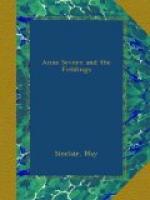And, day after day, their minds desired each other with a subtle, incessant, intensely conscious longing, and were utterly cut off from all communion. They met now at longer and longer intervals, for their work separated them. Colin had come home in October, perfectly recovered, and he and Jerrold managed the Manor estate together while Anne looked after her own farm. Jerrold never saw her, he never tried to see her unless Colin or Maisie or some of the farm people were present; he was afraid and Anne knew that he was afraid. Her sense of his danger made her feel herself fragile and unstable. She, too, avoided every occasion of seeing him alone.
And this separation, so far from saving them, defeated its own end. Every day it brought them nearer to the breaking point. It was against all nature and all nature was against it. They had always before them that vision of the point at which they would give in. Always there was one thought that drew them to the edge of surrender: “I can bear it for myself, but I can’t bear it for him,” “I can bear it for myself, but I can’t bear it for her.”
And to both of them had come another fear, greater than their dread of Maisie’s pain, the fear of each other’s illness. Their splendid physical health was beginning to break down. They worked harder than ever on the land; but hard work exhausted them at the end of the day. They went on from a sense of duty, dull and implacable, but they had no more pleasure in it. Anne became every night more restless, every day more tired and anaemic. Jerrold ate less and slept less. They grew thin, and their faces took on the same look of fatigue and anxiety and wonder, as if, more than anything, they were amazed at a world whose being connived at and tolerated their pain.
Maisie saw it and felt the first vague disturbance of her peace. Her illness had worried everybody while it lasted, but she couldn’t think why, when she was well again, Anne and Jerrold should go on looking like that. Maisie thought it was physical; the poor dears worked too hard.
The change had been so gradual that she saw it without consternation, but when Eliot came down in November he couldn’t hide his distress. To Eliot the significant thing was not Anne’s illness or Jerrold’s illness but the likeness in their illnesses, the likeness in their faces. It was clear that they suffered together, with the same suffering, from the same cause. And when on his last evening Jerrold took him into the library to consult him about Maisie’s case, Eliot had a hard, straight talk with him about his own.
“My dear Jerrold,” he said, “there’s nothing seriously wrong with Maisie. I’ve examined her heart. It isn’t a particularly strong heart, but there’s no disease in it. If you took her to all the specialists in Europe they’d tell you the same thing.”
“I know, but I keep on worrying.”
“That, my dear chap, is because you’re ill yourself. I don’t like it. I’m not bothered about Maisie, but I am bothered about you and Anne.”




